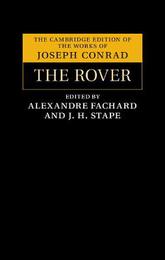
|
The Rover
Hardback
Main Details
Description
Set in the South of France during the waning days of the French Revolution and the early years of Napoleonic rule, The Rover (1923) is the last novel that Conrad completed in his lifetime. A popular success on its publication, it explores, against the backdrop of dramatic political change and the Anglo-French hostilities leading up to the Battle of Trafalgar, the themes of personal and national identity, loyalty and love. The 'Introduction' situates the novel in Conrad's career and traces its sources and contemporary reception. Explanatory notes illuminate literary and historical references and indicate Conrad's sources. The essay on the text and the apparatus lay out the history of the work's composition and publication, detail the interventions in the text by Conrad's typists, compositors and editors and explain editorial policy. This edition of The Rover, established through modern textual scholarship, presents the novel in a form more authoritative than any so far printed.
Author Biography
Alexandre Fachard, Charge d'enseignement suppleant at the Universite de Geneve, teaches English literature. He has edited Within the Tides (2012) and co-edited Victory (2016) for the Cambridge Edition of the Works of Joseph Conrad, and has written and reviewed for The Conradian, The Yearbook of Conrad Studies, Variants, The Literary Encyclopedia, American Studies Journal, the Journal of American Studies, Translation and Literature and Cahiers edouardiens et victoriens. J. H. Stape was a Senior Research Fellow at St Mary's University College, London and taught at universities in England, Canada, France and the Far East. The author of The Several Lives of Joseph Conrad (2007) and editor of The Cambridge Companion to Joseph Conrad (Cambridge, 1996) and The New Cambridge Companion to Joseph Conrad (Cambridge, 2015), he edited and co-edited several volumes in the Cambridge Edition of the Works of Joseph Conrad, of which he was co-General Editor from 2008 to 2015. He also published on E. M. Forster, William Golding, Thomas Hardy, Frank Harris, Angus Wilson and Virginia Woolf.
|